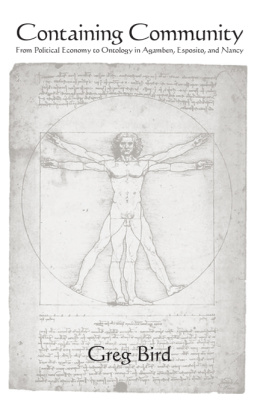Esposito Roberto - A philosophy for Europe: from the outside
Here you can read online Esposito Roberto - A philosophy for Europe: from the outside full text of the book (entire story) in english for free. Download pdf and epub, get meaning, cover and reviews about this ebook. City: Cambridge;UK;Europe;Medford;MA;USA, year: 2018, publisher: Polity Press, genre: Religion. Description of the work, (preface) as well as reviews are available. Best literature library LitArk.com created for fans of good reading and offers a wide selection of genres:
Romance novel
Science fiction
Adventure
Detective
Science
History
Home and family
Prose
Art
Politics
Computer
Non-fiction
Religion
Business
Children
Humor
Choose a favorite category and find really read worthwhile books. Enjoy immersion in the world of imagination, feel the emotions of the characters or learn something new for yourself, make an fascinating discovery.
- Book:A philosophy for Europe: from the outside
- Author:
- Publisher:Polity Press
- Genre:
- Year:2018
- City:Cambridge;UK;Europe;Medford;MA;USA
- Rating:3 / 5
- Favourites:Add to favourites
- Your mark:
- 60
- 1
- 2
- 3
- 4
- 5
A philosophy for Europe: from the outside: summary, description and annotation
We offer to read an annotation, description, summary or preface (depends on what the author of the book "A philosophy for Europe: from the outside" wrote himself). If you haven't found the necessary information about the book — write in the comments, we will try to find it.
A philosophy for Europe: from the outside — read online for free the complete book (whole text) full work
Below is the text of the book, divided by pages. System saving the place of the last page read, allows you to conveniently read the book "A philosophy for Europe: from the outside" online for free, without having to search again every time where you left off. Put a bookmark, and you can go to the page where you finished reading at any time.
Font size:
Interval:
Bookmark:


First published in Italian as Da fuori. Una filosofia per L'Europa, Giulio Einaudi editore S.p.A, Turin, 2016
This English edition Polity Press, 2018
Polity Press
65 Bridge Street
Cambridge CB2 1UR, UK
Polity Press
101 Station Landing
Suite 300
Medford, MA 02155, USA
All rights reserved. Except for the quotation of short passages for the purpose of criticism and review, no part of this publication may be reproduced, stored in a retrieval system or transmitted, in any form or by any means, electronic, mechanical, photocopying, recording or otherwise, without the prior permission of the publisher.
ISBN-13: 978-1-5095-2105-0
ISBN-13: 978-1-5095-2106-7 (pb)
A catalogue record for this book is available from the British Library.
Library of Congress Cataloging-in-Publication Data
Names: Esposito, Roberto, 1950- author.
Title: A philosophy for Europe : from the outside / Roberto Esposito; translated by Zakiya Hanafi.
Other titles: Da fuori. English
Description: English edition. | Cambridge, UK ; Medford, MA, USA : Polity Press, 2018. | Translation of: Da fuori : una filosofia per lEuropa, 2016. | Includes bibliographical references and index.
Identifiers: LCCN 2017040343 (print) | LCCN 2017060403 (ebook) | ISBN 9781509521098 (Epub) | ISBN 9781509521050 | ISBN 9781509521067 (pb)
Subjects: LCSH: Philosophy, European20th century. | Philosophy, European21sth century. | EuropeCivilizationPhilosophy.
Classification: LCC B804 (ebook) | LCC B804 .E74613 2018 (print) | DDC 190dc23
LC record available at https://lccn.loc.gov/2017040343
Typeset in 10.5 on 12.5 pt Sabon Roman by Toppan Best-set Premedia Limited
Printed and bound in the UK by CPI Group (UK) Ltd, Croydon
The publisher has used its best endeavours to ensure that the URLs for external websites referred to in this book are correct and active at the time of going to press. However, the publisher has no responsibility for the websites and can make no guarantee that a site will remain live or that the content is or will remain appropriate.
Every effort has been made to trace all copyright holders, but if any have been inadvertently overlooked the publisher will be pleased to include any necessary credits in any subsequent reprint or edition.
For further information on Polity, visit our website: politybooks.com
My thanks to Zakiya Hanafi for her care and skill in translating this book and to Manuela Tecusan for her excellent copyediting.
If it is true, as Hegel wrote, that the need for philosophy arises when the power of unification disappears from human life and oppositions lose their living relation and interaction, then nothing is more relevant than a philosophy for Europe. What goes by the name of Union has never faced a greater risk of coming apart, unless the oppositions that divide it manage to stick together in a meaningful relationship. Rather than relating to each other through their differences, its parts seem to be dispersed in an unrelated multiplicity that lacks even the constitutive force of conflict. The separation affects not just the member countries but something more profound, which pertains to their very incentive for staying together as if the reality of Europe had become drastically estranged from its purpose, flattening into the bare fact of its geography. In the new order that the world is assuming, when everything calls for a strong European polarity, Europe appears devoid not only of a recognizable body but even of a soul. For this reason it might well be said that, even more than being separated internally, Europe is separated from itself from what it should mean. The interests of its members, not to mention the values they bear, find no place of composition and not even a clear front over which to divide. They diverge in a lazy manner, which alternates between disorder and indifference. None of the big questions that touch its peoples to the core from the still festering wound of the economic recession to the growing pressure of migratory flows and to the unprecedented threat of terrorism produces a shared response, while politics itself is rejected by larger and larger segments of the citizenry. And all this is happening right at a time when only a high-profile political vision what Nietzsche called grand politics could adequately respond to the economic, social, and military challenges that press upon us. While economic unification appears compromised to its roots by an untenable disparity in resources between member countries, the absence of political integration leaves Europe defenseless from the deadly attacks of its enemies.
This stalemate is precisely what opens up a new space for philosophical reflection not because the latter has solutions at hand for highly complex problems but because, in times of drastic changes on the world scene, philosophy may be in a better position than other types of discourse to recognize beforehand the direction the events are taking. In certain cases, situated anywhere but in the twilight of historical epochs, philosophy can illuminate the contours of an era even before its outlines have settled into a solid figure. Of course, the individual stages of a crisis can be discerned through the social, economic, and political sciences. But when every point of reference is in a process of change such as the one we experience today, only philosophy is capable of grasping them together as a whole. When every avenue seems blocked, philosophy has a creative power that's often missing from other disciplines, which may be more oriented to the past, like history, or have less depth, like political science. Thus, when thinking about Europe in economic terms is no longer sufficient and imagining a political order for it seems absurd, it may well be that the only avenue still open is the one excavated by thought.
No wonder, then, that the most fitting analytical toolkit for interpreting the European situation comes precisely from the creative work spaces opened up by philosophical research. I am referring to the biopolitical paradigm developed over the past 20 years in France and Italy and spreading from there throughout the world, among the guardians of the old philosophicalpolitical lexicon and their skepticism. Because, without sufficient warning, what was experienced for a long time as a simple economic crisis one that soon implicated the European Union's political institutions turned out to be a much more dramatic, biopolitical crisis. The growing number of bodies, alive or dead, carried for some time now by the Mediterranean current toward the southern coasts of Europe and the simultaneous attack launched by Islamic fundamentalism express the magnitude and urgency of this turning point. The earlier financial earthquake that shook the European states drove entire sectors of the population to the threshold of pure survival, anticipating the direction of events to come. At the same time, the European Union's inability to absorb into its organs the portion of sovereignty lost by individual countries has made it clear that this concept fails to represent what happens in a regime that by now seems to have preserved nothing from the sovereign but debt.
But the magnitude of the migratory flow that has collided with Europe, on the one hand, the war that has broken out in its streets, on the other, signal a qualitative leap that was unimaginable only a few years ago. Obviously, in order to be understood, these unprecedented events need to be thought about together which is to say, they need to be articulated, but also kept clearly distinct. All at once, they lay bare something we have difficulty perceiving because it is foreign to what we have taken for granted since the mid-twentieth century: the relative homogeneity of the European population and the absence of war inside its borders. Suddenly it is as if a curtain had been torn down, revealing a landscape that Europe's inhabitants were slow to perceive; now it is laid bare in all its complexity before their astonished eyes. What has been defined euphemistically as a humanitarian emergency presents the characteristics of a structural earthquake destined to alter the features of the Union through the composition of its very peoples. Perhaps for the first time since World War II, the drastic options available to European governments for dealing with mass immigration have placed politics in direct contact with the biological life of millions of human beings in flight from their homelands, devastated by war and hunger. Without exaggerating the importance of the ultimate question regarding their fate, they can be kept alive or left to die. The meaning of what we call Europe also depends to some extent on how it responds to this radical alternative. The terrorist attacks open up an even more lacerating wound, which puts the very future of Europe at stake, along with the foundations of our civilization. Death has erupted at the center of the political scene, with no more mediations, in the form of explosions that have bloodied the streets of Europe. In the direct entanglement between politics and biological life, the fate of the European continent is being played out, no differently from that of the rest of the world, on the precarious borderline that separates an affirmative biopolitics from a thanatopolitical crisis of unknown proportions. The fact that these are the pivotal categories at the heart of philosophical discussion worldwide is further confirmation of what has been said. Philosophy and crisis illuminate each other, in a grip that makes one the filter for recognizing the other.
Next pageFont size:
Interval:
Bookmark:
Similar books «A philosophy for Europe: from the outside»
Look at similar books to A philosophy for Europe: from the outside. We have selected literature similar in name and meaning in the hope of providing readers with more options to find new, interesting, not yet read works.
Discussion, reviews of the book A philosophy for Europe: from the outside and just readers' own opinions. Leave your comments, write what you think about the work, its meaning or the main characters. Specify what exactly you liked and what you didn't like, and why you think so.

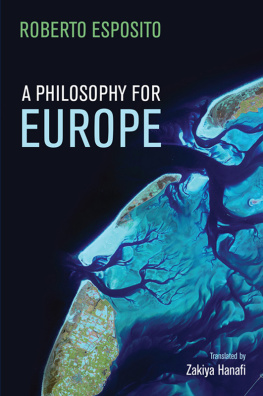
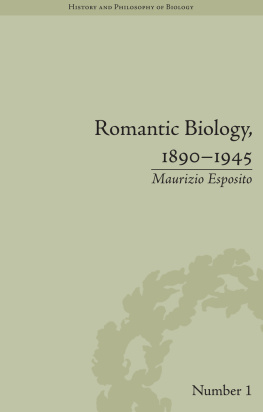

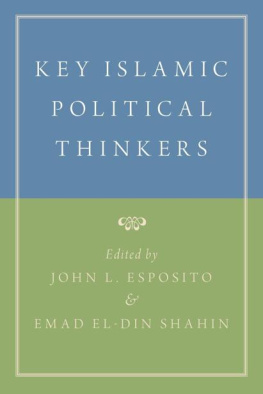
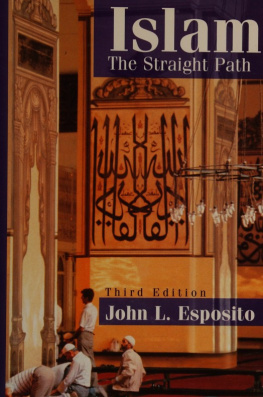


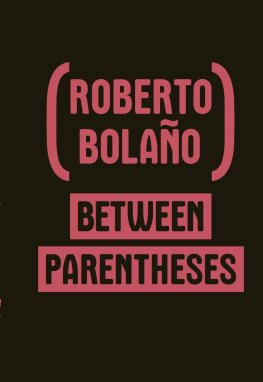



![Dino Esposito [Dino Esposito] - Microsoft® ASP.NET and AJAX: Architecting Web Applications](/uploads/posts/book/120575/thumbs/dino-esposito-dino-esposito-microsoft-asp-net.jpg)
